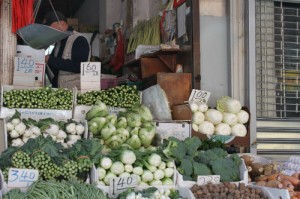 A couple of weeks ago, I was having drinks after work with some girlfriends when one proclaimed that she doesn’t buy organic blueberries but the ones she buys are local.
A couple of weeks ago, I was having drinks after work with some girlfriends when one proclaimed that she doesn’t buy organic blueberries but the ones she buys are local.
In New York City, fruit stands conveniently dot the street corners in abundance. These are typically one-man operations that set up at sunrise and come down after the evening rush hour. They carry a variety of fruit like bananas, mangoes, cherries, even figs — sourced from a distributor and priced well-below retail.
It’s from one of these street vendors situated outside of her 42nd Street apartment building that my friend buys her blueberries in an effort to save money on organic prices. I feel her pain on the high price tag that comes with organic but it’s a sacrifice I choose to make. Not everyone does and that’s a matter of personal preference. However, I think a quick distinction between organic and local may be in order.
An organic product means that it was grown without the use of pesticides or chemicals. But it’s journey to your plate may have lasted days — even weeks — so it may not be as fresh by the time it is consumed. And if it was grown in a Summer climate across the world and reaches you in Winter, it’s not seasonal. Local food, on the other hand, may or may not be organic but has traveled a lesser distance because it was sourced near where you live. An added benefit is that the food is also seasonal since it used the conditions of the soil and climate of your locale.
While it’s unlikely that the fruit vendors of NYC offer local or organic produce, for my friend, it’s the easiest and most available way for her to buy and enjoy deliciously anti-oxidizing blueberries, which during the Summer months are an essential part of any diet and I applaude her for sticking to her version of local.
What’s your local?



Leave a Reply